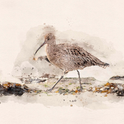There comes a moment in all complex, “talkie” poems when the writer must acknowledge that unavoidable predecessor of poetic difficulty, Mr TS Eliot. When the moment arrives in Daljit Nagra’s indiom, it is glancingly brief but nonetheless revealing: someone references an “Englisch Langwidge” poet “from Ind”, and a parenthetical aside informs us this reference “was made / by that great pretender / Mr Pound, of Mr Eliot’s Wasteland.”
It seems a dutiful though rather desultory tracing of literary genealogy. But this is typical of indiom. Taking the form of a series of freewheeling debates, it is a transgressive testing of tradition that treats its poetic ancestry with deft indifference (take, for example, that subtle misspelling of Eliot’s modernist masterpiece). Here is a mock epic revelling in its own irreverence.
“Langwidge”, then, is what’s up for debate and it is, quite literally, designed by committee. At the outset of indiom, a group of Indic-heritage poets gather to discuss and dissect poetry. Cantos open with statements that form something of a poetic manifesto (for example, one reads: “On the importance of keeping language alive, & how poets of colour should be read”), but this suggests a seriousness that is not truly part of indiom’s outlook.
The discussions between the poets quickly dissolve into rival claims for poetic expression; laid out almost as dialogue, there is something democratic about this debate encompassing so many voices.
In one instance, a character, sobbing, asks: “What of the British poets, with the skin of India - / on what terms are they seen as a voice by Britannia.” There is no answer given; the open-endedness of the question guaranteed as the debate lurches on. But if Nagra’s work is anything to go by, we can figure out an answer for ourselves: it is with wit and winning pathos.













